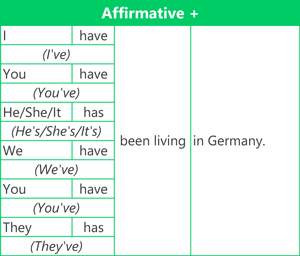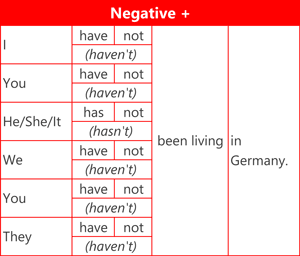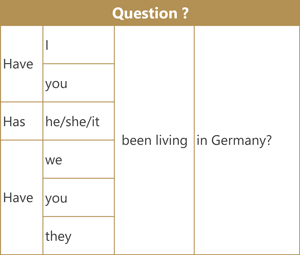What is the present perfect continuous?
The present perfect continuous (or present perfect progressive) is one of the English verb tenses.
You can learn more English online by visiting our free English grammar lessons, which include other verb tenses and more grammar points.
You can also find more grammar, vocabulary and communication tasks for each English level:
Use & examples |
The present perfect continuous tense links the past to the present (as well as the present perfect simple) and we use it to describe:

(1) Unfinished situations or periods of time
It describes situations (single or repeated) that started in the past and still continue to the present (and possibly into the future).
- I've been living in Munich for two years.
- I've been training at the gym recently.
The present perfect continuous focuses more on the unfinished action itself.
The present perfect simple focuses more on the completion or the present result than the action itself.

(2) Recently finished situations
It can also describe temporary actions that were finished recently (a short time ago) and have present results.
- You look tired.
Yes, I've been painting the house.
Form |
How do you write and pronounce the present perfect simple?
Form: Key points
- Use the auxiliary verb 'have' (have/has) + been + main verb (-ing).
Here are examples of the affirmative (positive) form, negative form and question form using the verb 'live'.


Contractions
It is also possible to contract subject pronouns with auxiliary verb + 'not'
- I've not
- He's/She's/It's not

Short answers
- Yes, I have. / No, I haven't.
- Yes, you have. / No, you haven't.
Other questions forms
- How long...?
(unfinished situations - used with for and since)
How long have you been living in Germany? For 2 years.
Pronunciation
We commonly use contractions (e.g. 'I've been meeting friends' or 'He hasn't been working today') for the present perfect continuous tense, especially when speaking English.
Notes |
For the present perfect continuous, we have extra information about:
- spelling exceptions for verbs and
- time expressions that you can use.
Spelling exceptions for verbs
Sometimes we need to remove a letter, and other times we need to add another letter. Here are the exceptions:
1) One 'e' at the end of a verb
Remove the final 'e' and add 'ing'.
Examples:
[live] I've been living in Germany.
[save] I've been saving money for a new car.
* Verbs ending in 'ee'
These follow the normal rules.
Examples:
[see] He's been seeing his friends.
2) Verb ends with consonant + one stressed vowel + one consonant
Double the final consonant and add 'ing'.
Examples:
[stop] I've been stopping work early recently.
* Verbs ending with an unstressed vowel
These follow the normal rules, and the last consonant is not doubled.
Examples:
[develop] They've been developing a new idea at the company.
3) Verb ends in 'l' (British English)
Double the final consonant and add 'ing'.
Examples:
[travel] I've been travelling with friends.
4) Verb ends with 'ie'
Change 'ie' to 'y' and add 'ing'.
Examples:
[lie] She's been lying to the teacher.
5) Verb ends with 'ic'
Add 'k' before -ing'.
Examples:
[panic] He's been panicking about the exam.
Time expressions used with present perfect continuous
Here are time markers that can be used with the present perfect continuous.
1) for
This gives a period of time.
Examples:
I've been working at this company for two years.
2) since
This gives a starting point.
Examples:
I've been living in this apartment since 2015.
3) this week / month / year / today / all day
These expressions can be used for periods of time that are not finished.
Examples:
He's been studying hard this week.
3) recently
This started not long ago.
Examples:
We've been going to the gym recently.
Quizzes |
Quiz 1: Unfinished situations or periods of time
Starting a fitness plan
[Topic: Sport, health and fitness]
Type the verbs in the present perfect continuous tense and use the affirmative, negative or question form.